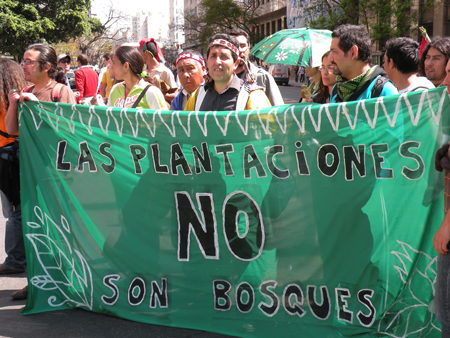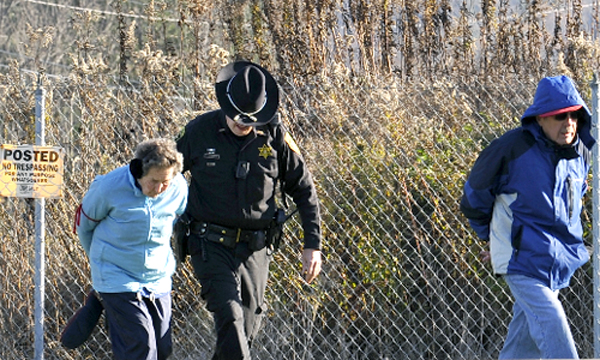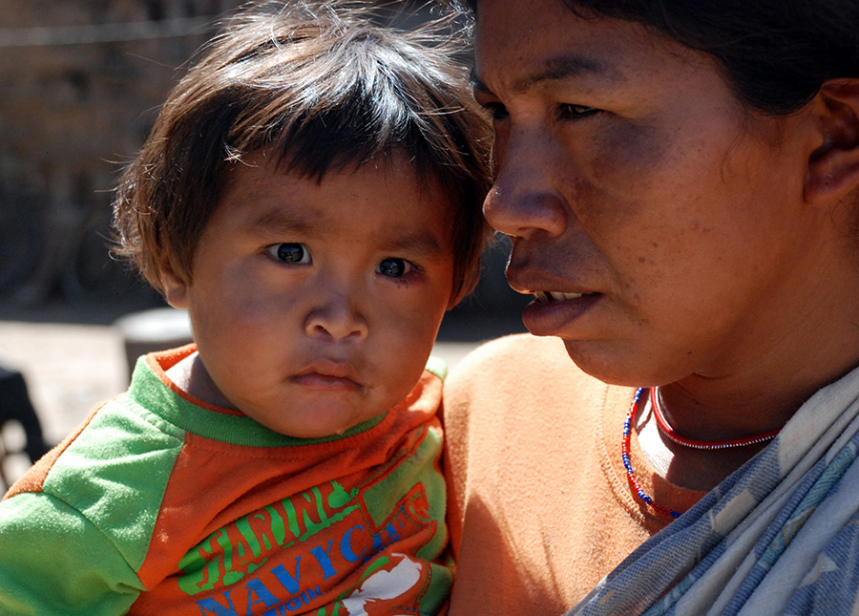In addition to being the day of the People’s Climate March, today is also the International Day of Action against Monoculture Tree Plantations. The issues of industrial tree plantations, genetically engineered trees and climate change are inextricably linked in many, many ways, and the statement below, put out by our allies at World Rainforest Movement, La Via Campesina and others, explains this.
At Ban Ki-moon’s upcoming Climate Summit, the corporate-dominated UN will try to sell tree plantations (and future GE tree plantations) as “climate smart.” This, even though studies have proven that tree plantations both store far less carbon than native forests and accelerate destruction of those forests to make room for new plantations.

“Plantations are not forests” Protest at the World Forestry Congress, Buenos Aires, Argentina, 2009 Photo: Petermann/GJEP-GFC
21 September 2014: 10th Anniversary of the International Day of Struggle against Monoculture Tree Plantations
Dismantle the power of transnational plantation corporations!
There is no “smart monoculture”
Ten years ago, at a meeting of 250 members of communities affected by large-scale eucalyptus plantations in Brazil, September 21st was established as the National Day against Tree Monocultures. The aim was to increase the visibility of the many peoples and communities struggling against tree monocultures, as a way of breaking the circle of silence around the numerous violations faced by the communities whose territories were surrounded by these monocultures. The day was also created in order to disseminate as widely as possible the evidence emerging from the resistance struggles about the negative social and environmental impacts of these plantations. The impacts on the lives of women in the affected communities are particularly severe. Recognizing the importance of the decision taken by the Brazilian communities, the World Rainforest Movement (WRM) decided in 2006 to make this day an International Day of Action.
This year, September 21st is also a day of mass mobilizations for Climate Justice. Thousands of people will join the People’s Climate March, while political leaders – and increasingly also corporate representatives – are meeting at the United Nations in New York City for the Climate Summit 2014, convened by UN Secretary General Ban Ki-moon. This summit represents yet another step towards the corporate takeover of the UN climate negotiations, and the privatization of land, water and air resources under the guise of a global climate pact.
The UN and other international agencies will launch the “Climate Smart Agriculture” initiated at the summit. This initiative is a new smokescreen being used to greenwash the worst practices of industrial agriculture: chemical fertilizers, industrial meat production, and genetically modified crops, such as tree plantations and other monocultures, which are being disguised as ‘climate smart’. Proponents of this dangerous false solution include the World Bank; they are seeking to turn the carbon in farmers’ fields into carbon credits, which would lead to land-grabbing and undermine real climate solutions.
The expansion of large-scale tree plantations of eucalyptus, pine, acacia, rubber and oil palm species, which may be defined as ‘climate smart’ if the proposal being discussed at the New York climate summit prospers, is furthering capital accumulation by large and often transnational corporations. Some of these corporations are Stora Enso, Arauco, APP/Sinar Mas, Bridgestone/Firestone, Wilmar, Olam and Sime Darby. Production from these large-scale monoculture plantations is for industrial and export purposes, and the rate of expansion has been devastating. The area of these plantations worldwide has increased four-fold since 1980. In the global South, eucalyptus and oil palm monocultures have experienced remarkable growth. Were it not for the widespread resistance of small farmers, indigenous peoples and rural communities in many countries, this expansion would probably have been even greater.
Transnational corporations are primarily responsible for the problems caused by plantations: land-grabbing and the seizure of common ‘resources’; destruction of biodiverse areas and their associated wildlife; the drying up and pesticide pollution of rivers, streams and springs; soil exhaustion and erosion; degrading working conditions; and the increasing financialization of nature, land and production. However, these corporations not only persist in denying and systematically concealing all these processes of social and environmental injustice; they even argue they are part of the ‘solution’ to the problems. Some of the market’s false solutions, which are really solutions beneficial primarily for financial capitalism itself, increase the injustices associated with monoculture. Among these false solutions are initiatives that legitimize corporations’ operations without requiring them to be accountable for the crimes and violations they commit.
Examples of this kind of ruse are ‘green’ certificates issued by the Forest Stewardship Council (FSC) and the Roundtable on Sustainable Palm Oil (RSPO) the ‘forest dialogue’, initiatives where civil society and corporations forge voluntary corporate commitments, and other so-called ‘sustainable’ initiatives, like phony commitments to ‘zero deforestation’. Although such action may lead to short-term benefits for local communities in some places, they have mainly led to frustration and community division, by promising ‘compensation’ that does not fulfill people’s key demands for guaranteeing their way of life, the return and respect for their territories, and an end to the environmental injustice caused by monocultures.
These initiatives are ‘voluntary,’ that is, they are not legally binding, and therefore lack a democratic institutional framework whose main goal is to protect the rights of the people affected. In this way, these initiatives, without aiming to change the destructive logic of capital, ultimately legitimize the expansion of a production model that we call neocolonial, because it destroys ways of life, is based on environmental racism and does not question any of its fundamental premises, such as the concentration of land and production in large-scale monocultures with poisonous pesticides and degrading working conditions. Moreover, “green” and “sustainable” initiatives and commitments do not hinder big companies from further expanding their plantations and encroaching on local people’s territories.
Increasingly serious is the rise of “flex tree” monocultures, producing multiple-use trees and forest commodities that are perceived to be interchangeable (energy, wood, food, carbonsequestration, etc.). Their “flexible” nature is of major interest to financial capital, which is increasingly promoting, together with the monoculture tree plantations corporations, the speculation over the control of production and land uses. These companies continue to insist on commercial uses of transgenic trees, as well as other uses of wood for energy purposes, and on selling ‘environmental services’ such as carbon. These are all false solutions to the environmental and climate crisis confronting human societies today, and they ultimately exacerbate injustice, hunger and poverty. Monocultures and transgenic crops are not smart; they are one more tool of ‘green’ capitalism to grab peoples’ lands, undermining those who are building real solutions to the social, environmental and climate crisis.
To confront the impact of the big corporations and the expansion of plantations, we must continue to push for the transformation of this model of production and to fight the neoliberal policies that favour big capital. An important step is for us to join forces in the framework of the “Campaign to Dismantle Corporate Power”, in order to build and strengthen instruments to put a stop to the architecture of impunity and legitimation that corporations enjoy today.
The starting point of the Campaign is the struggle of communities resisting the invasion of their territories by transnational corporations, or their fight to expel transnational corporations from their territories. It affirms the right of peoples to freely determine their own way of life. Agrarian reform and the demarcation of indigenous peoples’ territories and those of other traditional and small farmer populations all over the world are urgently needed actions to make headway in the struggle for food sovereignty, social and environmental justice, and people’s power.
We cannot end this declaration without paying tribute to the women and men all over the world who carry out a daily struggle, in different ways, against monoculture tree plantations. They have already achieved important victories in the defense and recovery of their territories and the biodiversity they need for their physical and cultural survival. These women and men, in their arduous and long-suffering struggles for the cause of life and the future, stand in sharp contrast to the greed of the big corporations and investors that seek to appropriate ever more same lands to generate profits for their shareholders.
“Plantations are not forests!”
“There are no smart monocultures!”
September 21st, 2014
Campaign to Dismantle Corporate Power and Stop Impunity
La Via Campesina
World March of Women
Friends of the Earth International
World Rainforest Movement (WRM)







